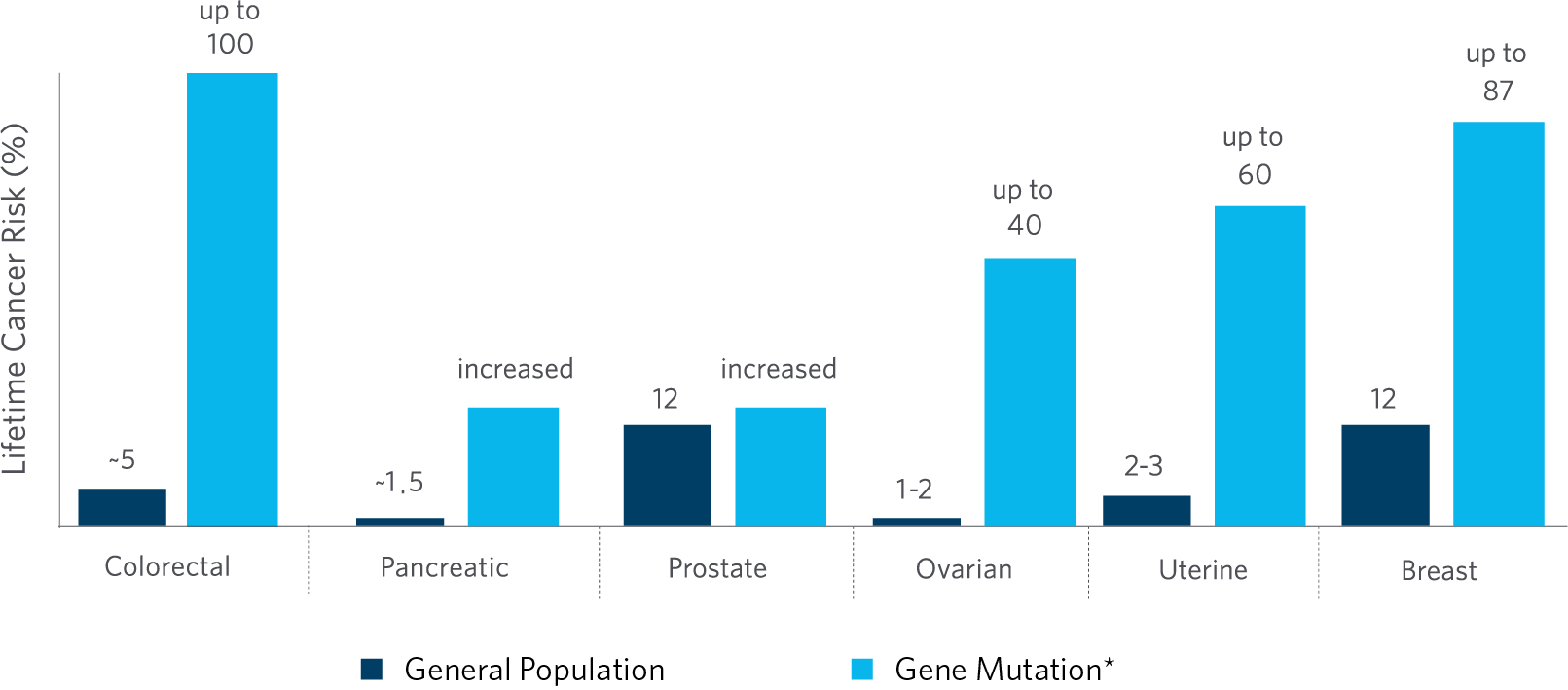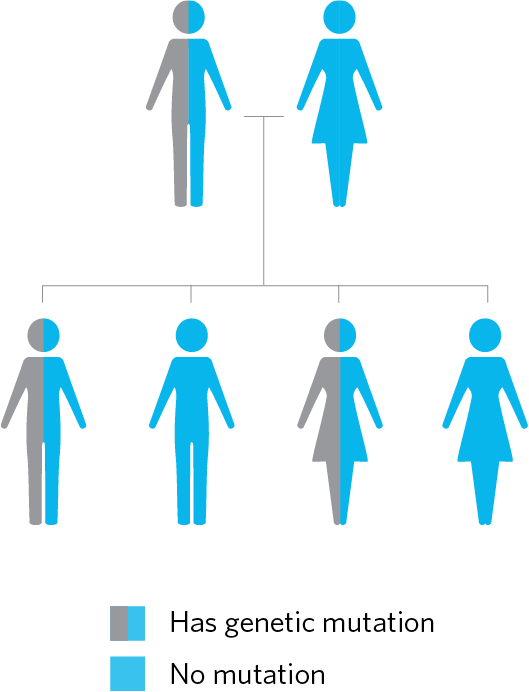About Hereditary Cancer
5-10% of cancer is hereditary
For some, cancer is a known threat because they have inherited an increased risk for cancer in their genes—it runs in the family.
About 10% of all cancers are hereditary, and can be traced to an inherited mutation in one of the genes that play a role in protecting the body against cancer. These mutations cannot develop later in life. People who have these gene mutations are born with them and are at greater risk for cancer than the general population. The level of risk and the type of cancer depend on the gene mutation.
LIFETIME CANCER RISK FOR COMMON CANCERS (%)
 *This graph represents the highest risks associated with some genes in Hereditary Cancer.
*This graph represents the highest risks associated with some genes in Hereditary Cancer.
What Is the Potential Impact of Genetic Testing for Cancer Risk?
YOUR GENETIC TEST RESULTS CAN FOREWARN YOU AND YOUR FAMILY MEMBERS ABOUT A HIDDEN CANCER RISK
Being diagnosed with a hereditary condition can be scary. That's why early detection is so important.
Potential Impact of Genetic Testing
Based on your test results, your healthcare provider may:



Potential Impact for Your Family Members
If you test positive for a genetic mutation, there may be up to a 50/50 random chance that your close family members (parents, brothers, sisters and children) will also have the same mutation.

How Do I Know if I'm a Candidate for Genetic Testing?
IF YOU ANSWER “YES” TO ANY OF THE QUESTIONS BELOW*, YOU MAY WANT TO CONSIDER TALKING TO YOUR HEALTHCARE PROVIDER ABOUT HEREDITARY CANCER GENETIC TESTING
Have you or your family members been diagnosed with:
Cancer at a young age (younger than 50 years old)?
More than one cancer?
Cancers you’ve been told are usually rare, such as ovarian or pancreatic cancer?
Have multiple people on the same side of your family had cancer?
Have any of your family members been found to have a cancer gene mutation?
If your responses indicate that you may be at-risk for hereditary cancer, there's no need to panic.
Not everyone who has a risk will necessarily go on to develop disease. Genetic test results are a tool to help clarify your cancer risk, and inform your healthcare provider in determining the best plan of action moving forward.
*Your healthcare provider may identify other reasons why it may be beneficial for you to consider genetic testing

Take our hereditary cancer quiz
What Test Results Can I Expect? And What Do I Do Once I Have Them?
POSITIVE, NEGATIVE OR VARIANT OF UNKNOWN SIGNIFICANCE (VUS)
Results from your genetic tests will fall into one of three categories:
A mutation related to an inherited cancer has been found in at least one of your tested genes
A positive result confirms an increased risk for an inherited cancer, and may be the basis for medical management recommendations specific to the gene that has a mutation
As previously noted, a positive result also indicates there may be up to a 50/50 random chance that each of your children, brothers, sisters, and parents has this same mutation and, like you, are at increased risk to develop the cancer linked to your mutation. Therefore, genetic testing for additional family members may be recommended
No cancer-linked genetic mutations were found in any of your tested genes
Since inherited disease risk(s) and management recommendations are based on personal and family history as well as genetics, you will want to discuss next steps with your healthcare provider
Despite your negative result, genetic testing may be advisable for family members depending on their clinical history
At least one genetic mutation was found, but it is unclear if this change causes an increased risk for an inherited cancer
Management recommendations should be based on personal or family history
These results may change over time as we learn more information, and you could possibly get an updated result in the future
Tests and Gene Information
Find information about our cancer tests here. Click the arrows to expand the gene list to see all of genes that are included on each test. By clicking on each gene, you can find more information that would be important for a person who tests positive for a mutation in that gene. These Understanding Your Results pages are included with positive test reports from Ambry.
BRCA1/BRCA2
BRCA1/2 mutations are the most common causes of hereditary breast and ovarian cancer (HBOC). This tests for BRCA1/BRCA2.
CancerNext®
Testing for hereditary cancer; includes genes linked to a higher chance of developing breast, ovarian, colorectal, uterine, prostate and/or other cancers.
CancerNext-Expanded®
Testing for hereditary cancer, including genes linked to a higher chance to develop one or more of the following: brain tumors, breast, colon, ovarian, pancreatic, prostate, kidney, uterine, and/or other cancers.
CancerNext®
Testing for hereditary cancer; includes genes linked to a higher chance of developing breast, ovarian, colorectal, uterine, prostate and/or other cancers.
CancerNext-Expanded®
Testing for hereditary cancer, including genes linked to a higher chance to develop one or more of the following: brain tumors, breast, colon, ovarian, pancreatic, prostate, kidney, uterine, and/or other cancers.
CancerNext®
Testing for hereditary cancer; includes genes linked to a higher chance of developing breast, ovarian, colorectal, uterine, prostate and/or other cancers.
CancerNext-Expanded®
Testing for hereditary cancer, including genes linked to a higher chance to develop one or more of the following: brain tumors, breast, colon, ovarian, pancreatic, prostate, kidney, uterine, and/or other cancers.
CustomNext-Cancer®
Designed for unique clinical scenarios requiring flexibility. Clinicians select from 90 genes to create a custom test for hereditary cancer predisposition.
| AIP | ALK | APC | ATM |
ATRIP |
AXIN2 | BAP1 | BARD1 |
| BMPR1A | BRCA1 | BRCA2 | BRIP1 | CDC73 | CDH1 | CDK4 | CDKN1B |
| CDKN2A | CEBPA | CFTR | CHEK2 |
CPA1 |
CTNNA1 |
CTRC |
DDX41 |
| DICER1 | EGFR |
EGLN1 |
EPCAM | ETV6 | FH | FLCN | GATA2 |
| GREM1 | HOXB13 |
KIF1B |
KIT | LZTR1 | MAX | MBD4 | MEN1 |
| MET | MITF | MLH1 | MLH3 | MSH2 | MSH3 | MSH6 | MUTYH |
| NF1 | NF2 | NTHL1 | PALB2 | PALLD | PDGFRA | PHOX2B | PMS2 |
| POLD1 | POLE | POT1 | PRKAR1A | PRSS1 | PTCH1 | PTEN |
RAD51B |
| RAD51C | RAD51D | RB1 | RET |
RNF43 |
RPS20 | RUNX1 | SDHA |
| SDHAF2 | SDHB | SDHC | SDHD | SMAD4 | SMARCA4 | SMARCB1 | SMARCE1 |
|
SPINK1 |
STK11 | SUFU | TERT | TMEM127 | TP53 | TSC1 | TSC2 |
| VHL | WT1 |
Tests and Gene Information
Click on the disease or category below to see all genes that appear on the test.
-
Breast + Gynecological
-
BRCA1/BRCA2
BRCA1/2 mutations are the most common causes of hereditary breast and ovarian cancer (HBOC). This tests for BRCA1/BRCA2.
Gene List
BRCA1, BRCA2
-
BRCAplus®
A 13-gene test for hereditary breast cancer; includes genes linked to a higher chance of developing breast, ovarian, and other cancers.
Gene List
ATM, BARD1, BRCA1, BRCA2, CDH1, CHEK2, NF1, PALB2, PTEN, RAD51C, RAD51D, STK11, TP53
-
BRCANext®
A test for hereditary breast and gynecologic cancers; includes genes linked to a higher chance of developing breast, ovarian, uterine, and other cancers.
Gene List
ATM, BARD1, BRCA1, BRCA2, BRIP1, CDH1, CHEK2, EPCAM, MLH1, MSH2, MSH6, NF1, PALB2, PMS2, PTEN, RAD51C, RAD51D, STK11, TP53
-
CancerNext®
Testing for hereditary cancer; includes genes linked to a higher chance of developing breast, ovarian, colorectal, uterine, prostate and/or other cancers.
Gene List
APC, ATM, AXIN2, BAP1, BARD1, BMPR1A, BRCA1, BRCA2, BRIP1, CDH1, CDKN2A, CHEK2, EPCAM, FH, FLCN, GREM1, HOXB13, MBD4, MET, MLH1, MSH2, MSH3, MSH6, MUTYH, NF1, NTHL1, PALB2, PMS2, POLD1, POLE, PTEN, RAD51C, RAD51D, RPS20, SMAD4, STK11, TP53, TSC1, TSC2, VHL
-
CancerNext-Expanded®
Testing for hereditary cancer, including genes linked to a higher chance to develop one or more of the following: brain tumors, breast, colon, ovarian, pancreatic, prostate, kidney, uterine, and/or other cancers.
Gene List
AIP, ALK, APC, ATM, AXIN2, BAP1, BARD1, BMPR1A, BRCA1, BRCA2, BRIP1, CDC73, CDH1, CDK4, CDKN1B, CDKN2A, CEBPA, CHEK2, CTNNA1, DDX41, DICER1, EGFR, EPCAM, ETV6, FH, FLCN, GATA2, GREM1, HOXB13, KIT, LZTR1, MAX, MBD4, MEN1, MET, MITF, MLH1, MSH2, MSH3, MSH6, MUTYH, NF1, NF2, NTHL1, PALB2, PDGFRA, PHOX2B, PMS2, POLD1, POLE, POT1, PRKAR1A, PTCH1, PTEN, RAD51C, RAD51D, RB1, RET, RPS20, RUNX1, SDHA, SDHAF2, SDHB, SDHC, SDHD, SMAD4, SMARCA4, SMARCB1, SMARCE1, STK11, SUFU, TMEM127, TP53, TSC1, TSC2, VHL, WT1
-
Lynch Syndrome
Testing for Lynch syndrome, a hereditary colorectal and uterine cancer condition.
Gene List
EPCAM, MLH1, MSH2, MSH6, PMS2
-
-
Gastrointestinal
-
ColoNext®
A test with genes for hereditary colon cancer, including genes linked to a higher chance to develop colon polyps, colon and/or other cancers.
Gene List
APC, AXIN2, BMPR1A, CDH1, EPCAM, GREM1, MBD4, MLH1, MSH2, MSH3, MSH6, MUTYH, NTHL1, PMS2, POLD1, POLE, PTEN, RPS20, SMAD4, STK11, TP53
-
CancerNext®
Testing for hereditary cancer; includes genes linked to a higher chance of developing breast, ovarian, colorectal, uterine, prostate and/or other cancers.
Gene List
APC, ATM, AXIN2, BAP1, BARD1, BMPR1A, BRCA1, BRCA2, BRIP1, CDH1, CDKN2A, CHEK2, EPCAM, FH, FLCN, GREM1, HOXB13, MBD4, MET, MLH1, MSH2, MSH3, MSH6, MUTYH, NF1, NTHL1, PALB2, PMS2, POLD1, POLE, PTEN, RAD51C, RAD51D, RPS20, SMAD4, STK11, TP53, TSC1, TSC2, VHL
-
CancerNext-Expanded®
Testing for hereditary cancer, including genes linked to a higher chance to develop one or more of the following: brain tumors, breast, colon, ovarian, pancreatic, prostate, kidney, uterine, and/or other cancers.
Gene List
AIP, ALK, APC, ATM, AXIN2, BAP1, BARD1, BMPR1A, BRCA1, BRCA2, BRIP1, CDC73, CDH1, CDK4, CDKN1B, CDKN2A, CEBPA, CHEK2, CTNNA1, DDX41, DICER1, EGFR, EPCAM, ETV6, FH, FLCN, GATA2, GREM1, HOXB13, KIT, LZTR1, MAX, MBD4, MEN1, MET, MITF, MLH1, MSH2, MSH3, MSH6, MUTYH, NF1, NF2, NTHL1, PALB2, PDGFRA, PHOX2B, PMS2, POLD1, POLE, POT1, PRKAR1A, PTCH1, PTEN, RAD51C, RAD51D, RB1, RET, RPS20, RUNX1, SDHA, SDHAF2, SDHB, SDHC, SDHD, SMAD4, SMARCA4, SMARCB1, SMARCE1, STK11, SUFU, TMEM127, TP53, TSC1, TSC2, VHL, WT1
-
Lynch syndrome
Testing for Lynch syndrome, a hereditary colorectal and uterine cancer condition.
Gene List
EPCAM, MLH1, MSH2, MSH6, PMS2
-
-
Comprehensive
-
CancerNext®
Testing for hereditary cancer; includes genes linked to a higher chance of developing breast, ovarian, colorectal, uterine, prostate and/or other cancers.
Gene List
APC, ATM, AXIN2, BAP1, BARD1, BMPR1A, BRCA1, BRCA2, BRIP1, CDH1, CDKN2A, CHEK2, EPCAM, FH, FLCN, GREM1, HOXB13, MBD4, MET, MLH1, MSH2, MSH3, MSH6, MUTYH, NF1, NTHL1, PALB2, PMS2, POLD1, POLE, PTEN, RAD51C, RAD51D, RPS20, SMAD4, STK11, TP53, TSC1, TSC2, VHL
-
CancerNext-Expanded®
Testing for hereditary cancer, including genes linked to a higher chance to develop one or more of the following: brain tumors, breast, colon, ovarian, pancreatic, prostate, kidney, uterine, and/or other cancers.
Gene List
AIP, ALK, APC, ATM, AXIN2, BAP1, BARD1, BMPR1A, BRCA1, BRCA2, BRIP1, CDC73, CDH1, CDK4, CDKN1B, CDKN2A, CEBPA, CHEK2, CTNNA1, DDX41, DICER1, EGFR, EPCAM, ETV6, FH, FLCN, GATA2, GREM1, HOXB13, KIT, LZTR1, MAX, MBD4, MEN1, MET, MITF, MLH1, MSH2, MSH3, MSH6, MUTYH, NF1, NF2, NTHL1, PALB2, PDGFRA, PHOX2B, PMS2, POLD1, POLE, POT1, PRKAR1A, PTCH1, PTEN, RAD51C, RAD51D, RB1, RET, RPS20, RUNX1, SDHA, SDHAF2, SDHB, SDHC, SDHD, SMAD4, SMARCA4, SMARCB1, SMARCE1, STK11, SUFU, TMEM127, TP53, TSC1, TSC2, VHL, WT1
-
CustomNext-Cancer®
Designed for unique clinical scenarios requiring flexibility. Clinicians select from 90 genes to create a custom test for hereditary cancer predisposition.
Gene List
AIP, ALK, APC, ATM, ATRIP, AXIN2, BAP1, BARD1, BMPR1A, BRCA1, BRCA2, BRIP1, CDC73, CDH1, CDK4, CDKN1B, CDKN2A, CEBPA, CFTR, CHEK2, CPA1, CTNNA1, CTRC, DDX41, DICER1, EGFR, EGLN1, EPCAM, ETV6, FH, FLCN, GATA2, GREM1, HOXB13, KIF1B, KIT, LZTR1, MAX, MBD4, MEN1, MET, MITF, MLH1, MLH3, MSH2, MSH3, MSH6, MUTYH, NF1, NF2, NTHL1, PALB2, PALLD, PDGFRA, PHOX2B, PMS2, POLD1, POLE, POT1, PRKAR1A, PRSS1, PTCH1, PTEN, RAD51B, RAD51C, RAD51D, RB1, RET, RNF43, RPS20, RUNX1, SDHA, SDHAF2, SDHB, SDHC, SDHD, SMAD4, SMARCA4, SMARCB1, SMARCE1, SPINK1, STK11, SUFU, TERT, TMEM127, TP53, TSC1, TSC2, VHL, WT1
-

Useful Organizations to Know
American Society of Clinical Oncology
Want to Know More About Genetic Testing?
Ambry’s current menu of genetic tests is focused in four categories of genetic disease: Hereditary Cancer, Heart Conditions, Hereditary Neurological Disorders, and Other Rare Conditions. If the condition you are concerned about falls into one of these categories, click on the appropriate button to learn more.


